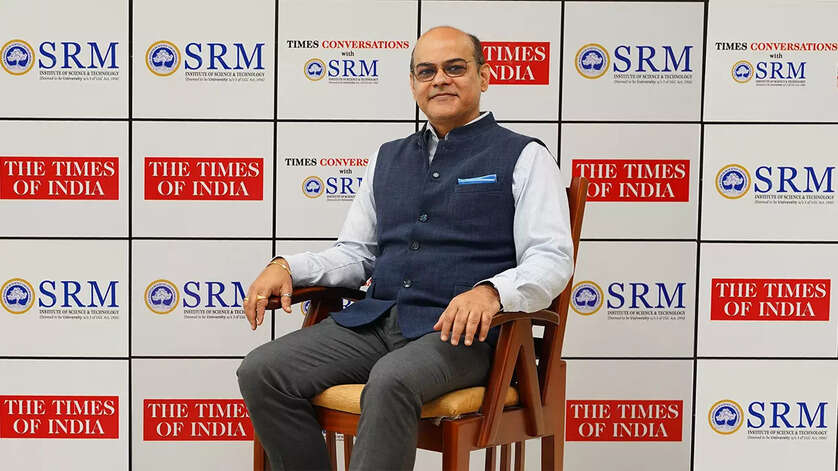ARTICLE AD BOX

The world of education is facing a big transformation. From artificial intelligence (AI) changing industries to sustainability reshaping corporate priorities and global trade rules being rewritten, the demands on future professionals are multiplying.
Traditional courses, once designed for stable times, now face the challenge of preparing students for a world marked by disruption, uncertainty, and rapid technological change.It is in this context that Professor A. Vinay Kumar, Pro Vice-Chancellor for the Faculty of Science, Humanities, Law, and Management at SRM Institute of Science and Technology, Kattankulathur Campus, brings his 25+ years of academic and administrative experience to reimagine higher education.
In a candid conversation with Times Conversation, he highlighted how law and business education must evolve, the role of AI in classrooms, and what it takes to prepare graduates for global challenges.As he put it, the future demands “agile, blended, and globally aware programs that prepare students for uncertainty.”
Algorithms in Courtrooms: How Technology is Reshaping the Future of Law | SRMSOL | SRMIST
Law education in the age of AILegal education, traditionally rooted in theory and precedent, is undergoing rapid transformation as technology reshapes classrooms and courtrooms alike. Prof. Kumar explained that AI will soon play a central role in how law students research, analyse cases, and interact with clients. But he was clear that technology should enhance, not replace, human learning. “AI is not a replacement for education or instruction in classrooms,” he said. “It is a supplement. The challenge is to integrate AI responsibly, alongside new technologies like virtual and augmented reality, to make learning more practical and impactful.”With this opportunity, however, comes responsibility. Prof. Kumar highlighted the lack of independent oversight on how algorithms are designed and deployed, warning of risks around bias and fairness. “The true impact of AI is not yet fully understood, even among education leaders,” he admitted. “What we do know is that legal professionals of the future must understand algorithms, fairness, and bias because these issues will increasingly be contested in courts of law.” He stressed the urgent need for curriculum reforms so that law graduates gain a deeper understanding of technology, on par with computer science students, while also strengthening practical skills like communication, negotiation, and mediation.He added that these skills will be essential as India faces massive judicial backlogs and alternative dispute resolution methods powered by AI become mainstream. “Communication, fairness, and accessibility will be as important as legal knowledge itself,” Prof. Kumar noted. Globalisation, too, adds complexity, with lawyers now expected to navigate hundreds of bilateral trade agreements as multilateral frameworks decline. “The international order is evolving rapidly,” he said. “Lawyers must be ready to navigate across 200 different trade agreements.” Prof. Kumar believes the future of legal education lies in blending technological literacy with global awareness and strong ethical foundations, ensuring graduates are ready for a world shaped by both innovation and complexity.Business education 2.0: Where tech meets leadershipThe world of business education is transforming rapidly. Traditional MBA programmes, once focused on producing corporate managers, must now prepare leaders who can adapt to disruption and uncertainty. Prof. Kumar explained that “the skill for leaders now is to deal with dilemmas and uncertainty,” adding that “business schools are trying to address this through more agile programs, experiential learning, and AI-driven tools.”While AI is becoming a significant part of business training, he cautioned against the hype surrounding it. “No business school has fully figured it out,” he said. “We are experimenting with agentic AI tools, but the long-term effects on industries are still unknown.” At the same time, a major shift is underway with sustainability and ESG (environmental, social, and governance) studies moving into the mainstream. “Sustainability and ESG are no longer electives; they are mainstream,” Prof. Kumar emphasised, noting that SRM Institute of Science & Technology, Kattankulathur campus, has already introduced specialised courses in these areas within its MBA programme.Internships and global exposure are also at the heart of SRM’s evolving approach. From partnerships with UK firms to longer internship durations, the university is rethinking how students gain practical experience. “What worked yesterday will not work today,” he said. “Every law and business school is rethinking the type of internships students should pursue.” Prof. Kumar believes that by combining technological adaptability, sustainability awareness, and real-world experience, business education will drive the next generation of leaders and fuel economic growth in the AI age.Reimagining learning for a new eraProf. Kumar believes education must evolve continuously to stay relevant in a rapidly changing world. MBA programmes, he explained, are moving toward shorter, modular formats with micro-credentials, online learning, and immersive internships becoming standard features. “Undergraduate research is a gateway to innovation and academic rigor,” he added, as SRM encourages students to explore research opportunities early in their academic journey.He also stressed the importance of holistic learning, noting that education must go beyond technical expertise to include creativity, culture, and global awareness. “Law graduates should learn music or dance, something that broadens their perspective,” he said, highlighting how exposure to arts and culture can shape more well-rounded professionals. At the same time, alumni and industry collaborations will play a key role in bridging the gap between classrooms and real-world challenges through guest lectures, field projects, and research tie-ups.The discussion highlighted that education systems must remain agile, globally aware, and future-ready to keep pace with rapid change. The future of legal education will lie in combining technology, ethics, and global perspectives, while business education will focus on driving innovation, sustainability, and leadership in an AI-powered world.Disclaimer: The article has been produced on behalf of SRM Institute of Science & Technology by the Times Internet's Spotlight team.



.png)
.png)
.png)
















 6 days ago
7
6 days ago
7







 English (US) ·
English (US) ·